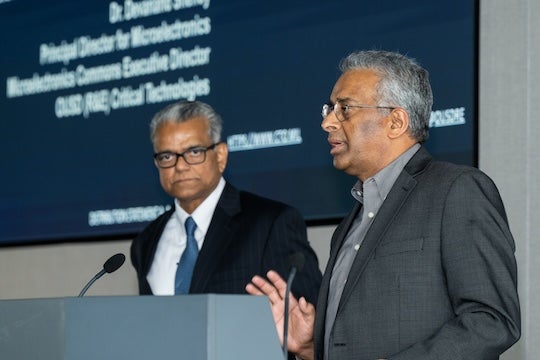Rice University’s National Security Research Accelerator hosted Dev Shenoy, the principal director for microelectronics at the U.S. Department of Defense (DOD), for a talk titled “Advancements in DOD’s Microelectronics: Bridging Innovation and National Security” at the Ralph S. O’Connor Building for Engineering and Science Aug. 29. Shenoy’s visit provided an opportunity for the university community to gain insights into the state of microelectronics.

Rice’s Executive Vice President for Research Ramamoorthy Ramesh introduced Shenoy and noted the growing significance of the microelectronics market, driven by technologies such as artificial intelligence, machine learning and the Internet of Things — a network of physical objects connected to the internet that can exchange data.
Underlining the urgent need for advancements in energy-efficient microelectronics, by 2030 computing could consume 25% of global energy, Ramesh said. “It becomes a national security problem that has got to be addressed,” he said.
During his lecture, Shenoy outlined the vision of the Office of the Under Secretary of Defense (OUSD) for Research and Engineering and emphasized the importance of semiconductors in maintaining U.S. competitiveness, enhancing energy efficiency and ensuring national security.
The CHIPS and Science Act of 2022 is a milestone in bolstering the U.S. semiconductor industry with $280 billion allocated to stimulate growth and innovation. Shenoy discussed the DOD’s ongoing efforts to advance microelectronics research and production to enhance national security and maintain U.S. leadership in this critical field.

One of the major initiatives mentioned was the SWAP Hub, which will receive nearly $40 million in funding this year as part of the DOD’s Microelectronics Commons, a $1.63 billion network of regional innovation hubs funded by the CHIPS and Science Act. This initiative is designed to strengthen microelectronics innovation and ensure the U.S. remains at the forefront of technological advancements.
Shenoy highlighted the importance of maintaining access to cutting-edge and legacy microelectronics technologies. There have been challenges to sustaining electronics in previous decades, and there is a need for a robust ecosystem that supports design, manufacturing, assembly, packaging and testing, he said.
“It’s all about ensuring we have access to legacy backgrounds,” Shenoy said.
Shenoy stressed the urgency for the U.S. to act swiftly in microelectronics to remain competitive in this global race. He called on universities and private industry to collaborate with the government in advancing microelectronics technologies, noting that such partnerships are crucial for national security and economic growth.

“What universities are really good at is developing great ideas, and what we want to try and do is turn those ideas into capabilities for the Department of Defense as well as other opportunities for commerce and agencies and the private industry,” Shenoy said.
As principal director for microelectronics at OUSD, Shenoy leads the DOD’s research and engineering efforts in microelectronics. He has provided numerous keynote addresses, participated in multiple discussion panels and given interviews across various industry, academic, interagency and defense communities. Before joining OUSD in 2021, Shenoy was the director of microelectronics innovation and advanced technologies at the University of Southern California’s Information Sciences Institute.
Rice’s Office of Research has recently introduced the Defense Research Advancement to focus on boosting national security by accelerating the discovery, development and application of technology in the defense and civilian sectors. This effort fosters scientific and engineering collaborations with academia, business, industry and government partners.

